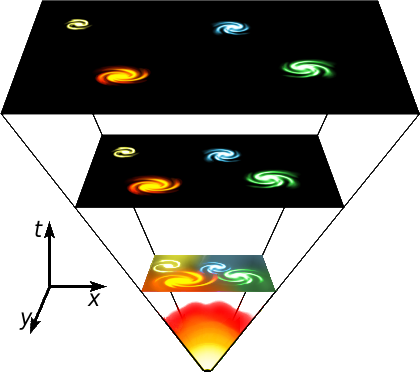Continued from a Previous Post…
 For some of you, the origin of our universe doesn’t interest you in the least. You don’t need to understand how something works to believe it. If that’s you, I’d just like to say, “Congratulations. It must be nice!” I say that tongue in cheek, but the reality is that you are lucky because there are those of us who cannot accept a truth unless it makes sense… completely. I will also share with you that, for me, having a concept in my head without a logical conclusion can keep me up all night and does so on a semi-regular basis. I have a slightly-more-than-minor compulsory issue which causes my mind to latch on to a specific problem and won’t let it go until it has a solution. So there are certain concepts that are off limits for me, two of which are eternity and infinitely. These two concepts hurt my brain just trying to envision them, so I don’t. I actually hate both concepts!
For some of you, the origin of our universe doesn’t interest you in the least. You don’t need to understand how something works to believe it. If that’s you, I’d just like to say, “Congratulations. It must be nice!” I say that tongue in cheek, but the reality is that you are lucky because there are those of us who cannot accept a truth unless it makes sense… completely. I will also share with you that, for me, having a concept in my head without a logical conclusion can keep me up all night and does so on a semi-regular basis. I have a slightly-more-than-minor compulsory issue which causes my mind to latch on to a specific problem and won’t let it go until it has a solution. So there are certain concepts that are off limits for me, two of which are eternity and infinitely. These two concepts hurt my brain just trying to envision them, so I don’t. I actually hate both concepts!
So, in discussing Atheist Pillar #1, I think it is important to first define the “playing field” in which I will both discuss the Nontheist position and my arguments from a Theist’s perspective. The “playing field” for this discussion is going to be based on the Big Bang Theory. Since it is the most widely accepted theory on how the universe came to be, it only makes sense to construct an argument framed within that understanding. I found a short and concise layman’s definition of the big bang on the National Geographic website, it is as follows:
Before the big bang, scientists believe, the entire vastness of the observable universe, including all of its matter and radiation, was compressed into a hot, dense mass just a few millimeters across. This nearly incomprehensible state is theorized to have existed for just a fraction of the first second of time. Big bang proponents suggest that some 10 billion to 20 billion years ago, a massive blast allowed all the universe’s known matter and energy—even space and time themselves—to spring from some ancient and unknown type of energy. The theory maintains that, in the instant—a trillion-trillionth of a second—after the big bang, the universe expanded with incomprehensible speed from its pebble-size origin to astronomical scope. Expansion has apparently continued, but much more slowly, over the ensuing billions of years. Scientists can’t be sure exactly how the universe evolved after the big bang. Many believe that as time passed and matter cooled, more diverse kinds of atoms began to form, and they eventually condensed into the stars and galaxies of our present universe.
This theoretical event is almost unbelievable in its own right, but couple that with the Nontheist position that the instant before the big bang (also called the singularity) and everything subsequent of that time was without design or purpose. It was chaos. There are many theists who have embraced the big bang theory, pointing to the singularity and that without a creator something magically appeared from nothing. There was a very well written paper (probably the best atheist position paper that I have read) by Quentin Smith, a renowned philosopher, author and also a self-proclaimed atheist that argued that opposite. (It is very technical, but you can find his paper here) His position was based on the “standard hot big bang theory”. This specific theory was designed around the ‘Friedmann equations’ and the ‘Hawking-Penrose singularity theorems’. Without getting too technical, the basis of his argument was (paraphrased) that during the fraction of a second that the singularity existed the laws of physics did not apply, as the singularity existed before the big bang and the big bang was what created space-time (which the laws of physics are exclusively based). Since the singularity existed outside space-time, and thus the laws of physics, there would have been no predictability in how particles would have been emitted or if they would ultimately result in an animate universe. So basically he is saying that since the starting point of the creation of the cosmos began outside the universe, then the laws of the universe could not apply because those laws are dependent on the universe. Make sense? He goes on to say that since there is no predictability and just chaos, then God could not know that what he created would ultimately result in life. Essentially it would mean, if we were to accept his position, that if there was a Creator and It created the universe with the big bang, he either got really, really lucky or he intervened sometime after the creation event. Smith then points out that, logically speaking, if the Creator intervened any time after the event then His Omnipotence would be in question as it would have been an extremely inefficient way to create the universe.
Honestly, as I read his position I couldn’t find fault with his logic. I agree with the position above that God would’ve designed it all in the beginning through something like the big bang, if not in the manner of the theory itself, or God did not design it at all. Fortunately, for this argument it is the former. So how can I refute his argument? Well without getting into physics, in which I have acknowledged that I have limited scope of knowledge, I will just focus on some of what I perceive to be flawed principles. First of all, I just recently came across an article from a couple years back that discussed the possibility of how the laws of physics can change depending on where you are in the universe. Without doing much more research on this, I can’t speak to its validity, but it does open up a door for my first objection to Mr. Smith’s argument:
- I agree that the laws of physics and space time break down at the singularity. However, with the big bang came those laws and the particles purposed with the creation of all the components of an animate universe. Mr. Smith seems to overlook the fact that if the universe was created and designed by God, then God would have had to design the laws of physics as well. Since he designed the components of the universe, the design for those components to come together, and the laws in which those components could operate, then the laws of physics that would govern those particles would have existed in His mind at the singularity point. I might even argue that the singularity was an actual thought of His.
As I think through my argument, I actually want to say that while the face of his argument was sound, the line of reasoning seemed to skip some valid points that would logically come into play. I know this article is almost 25 years old, but still don’t know whether he intentionally ignored these points while reasoning to his conclusion or if his subjective motives (of not wanting to a God to exist) prevented him from seeing the “whole picture”. Speaking of big picture, this is a great segue for my second, and last, objection to his argument:
- As any theist or nontheist would agree, there is little known about God and what is known is entirely based on one’s own personal experience, be it first, second or third hand knowledge. Consequently, one of the main arguments from a nontheist is that if God exists, He must then have a creator and that creator must have a creator… ad infinitum. This line of logic is great when it serves their thinly veiled subjective motives, but that same line of logic is not used for their evaluation of other arguments. Taking the line of reasoning to address the argument posed by Mr. Smith, I would point out that since God created the universe then it logically follows that He existed before the universe and hence outside out of it. If He existed outside this universe, there must be a space outside this universe that would operate under a whole different set of natural laws. Honestly I can only go so far with this argument because it teeters on the brink of infinity -which is like my kryptonite. However, this is not a problem exclusive to theist argument, but rather I have even more issues trying to comprehend the singularity or the big bang occurring without a creator.
I could come up with more arguments, but I honestly feel that my first argument on its own was enough to refute his position. That having been said, I will address another position in my next post.
Bye for now!
(END OF PART 2)

